- Serbia
Get to know Serbia
- Citizens
Culture and science
Health services
Pension and disability insurance
- Business
Employment
Economy
- Media
- Government
- Contact
Keep in touch
Contact form
Back
Keepin touch
Whether you have a question, comment, suggestion or any problem in the purview of the government, send us your message and we will try to respond as soon as possible. If your problem is not in our purview, we will forward your message to the relevant institution.
Q:
A:
Scope for intensifying economic cooperation between Serbia, Switzerland
Belgrade,
1 October 2009
State Secretary at the Serbian Ministry of Economy and Regional Development Vesna Arsic and State Secretary at the Swiss Secretariat for Economic Affairs Jean-Daniel Gerber singed today a Memorandum of Understanding between the two countries.
Arsic explained that the Memorandum concerns the implementation of a technical assistance programme for Serbia in its WTO accession process, adding that the global economic crisis has reduced trade between the two countries.
She said that Serbia imports high-tech products, remarking that there is a huge potential for both cooperation and new investment from Switzerland.
The State Secretary said that business conditions are stable and that Serbia is unilaterally implementing the transitional trade agreement with the EU which makes EU goods customs free.
Gerber said that Switzerland has fared considerably better during the crisis than other European countries, stressing that Serbia offers excellent conditions for investors and one of the most favourable tax systems, which is attracting a great deal of interest from Swiss companies.
Swiss Ambassador to Serbia Erwin Hofer said that Swiss businesses have been present in Serbia for a long time and that there is a huge potential for a much larger economic cooperation between the two countries, adding that despite this the volume of trade between Serbia and Switzerland has remained small.
He noted that Serbia is the key country in the region and if business is thriving there, so will business in the entire region, adding that Switzerland endorses Serbia in energy, SME establishment, humanitarian work, educational and municipal development.
Hofer noted that a new strategy for Switzerland’s presence in Serbia from 2010 until 2013 has been adopted, adding that his country endorses Serbia’s EU integration and access to the Schengen visa regime.
He added that over 100,000 Serbs living and working in Switzerland create a firm bridge for cooperation, adding that the Serbian language is the fourth key language in Switzerland.
Vice-President of the Serbian Chamber of Commerce Mihailo Vesovic specified that last year’s trade between the two countries was worth $337.8 million, 40% of which was Serbian exports, while in the first half of 2009 it stood at $127 million, 30% being Serbian exports.
He said that the foreign trade deficit is on the Serbian side, adding that it stems from the fact that Serbia’s economy is technologically underdeveloped and has to import a great deal of machinery from Switzerland.
Our agriculture, tourism, textile, metal, food and machine industries have the best chances of exporting to Switzerland, Vesovic concluded.
She said that Serbia imports high-tech products, remarking that there is a huge potential for both cooperation and new investment from Switzerland.
The State Secretary said that business conditions are stable and that Serbia is unilaterally implementing the transitional trade agreement with the EU which makes EU goods customs free.
Gerber said that Switzerland has fared considerably better during the crisis than other European countries, stressing that Serbia offers excellent conditions for investors and one of the most favourable tax systems, which is attracting a great deal of interest from Swiss companies.
Swiss Ambassador to Serbia Erwin Hofer said that Swiss businesses have been present in Serbia for a long time and that there is a huge potential for a much larger economic cooperation between the two countries, adding that despite this the volume of trade between Serbia and Switzerland has remained small.
He noted that Serbia is the key country in the region and if business is thriving there, so will business in the entire region, adding that Switzerland endorses Serbia in energy, SME establishment, humanitarian work, educational and municipal development.
Hofer noted that a new strategy for Switzerland’s presence in Serbia from 2010 until 2013 has been adopted, adding that his country endorses Serbia’s EU integration and access to the Schengen visa regime.
He added that over 100,000 Serbs living and working in Switzerland create a firm bridge for cooperation, adding that the Serbian language is the fourth key language in Switzerland.
Vice-President of the Serbian Chamber of Commerce Mihailo Vesovic specified that last year’s trade between the two countries was worth $337.8 million, 40% of which was Serbian exports, while in the first half of 2009 it stood at $127 million, 30% being Serbian exports.
He said that the foreign trade deficit is on the Serbian side, adding that it stems from the fact that Serbia’s economy is technologically underdeveloped and has to import a great deal of machinery from Switzerland.
Our agriculture, tourism, textile, metal, food and machine industries have the best chances of exporting to Switzerland, Vesovic concluded.
-
 Belgrade, 11 August 2025
Belgrade, 11 August 2025Support for agricultural projects worth RSD 750 million
-
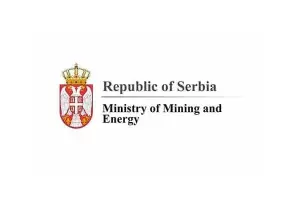 Belgrade, 21 July 2025
Belgrade, 21 July 2025Construction of oil pipeline with Hungary to begin early next year
-
 Belgrade/Athens, 17 July 2025
Belgrade/Athens, 17 July 2025Serbia continues to align with EU in field of energy
-
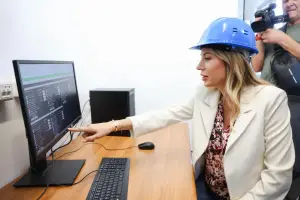 Kostolac, 14 July 2025
Kostolac, 14 July 2025First solar power plant Petka in Kostolac put into trial operation
-
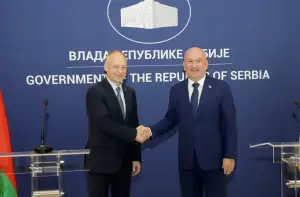 Belgrade, 11 July 2025
Belgrade, 11 July 2025Potential for improving cooperation with Belarus in many areas
-
 Požega, 5 July 2025
Požega, 5 July 2025Section of Pakovraće - Požega highway officially opened
-
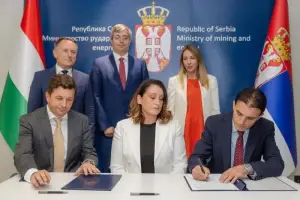 Belgrade, 2 July 2025
Belgrade, 2 July 2025Technical specifications defined for Serbia-Hungary oil pipeline
-
 Belgrade, 30 June 2025
Belgrade, 30 June 2025IMF confirms Serbia successfully implementing all agreed reforms
-
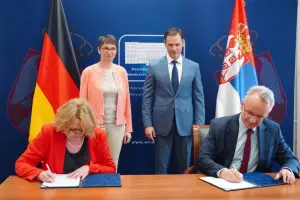 Belgrade, 27 June 2025
Belgrade, 27 June 2025Double Taxation Avoidance Agreement with Germany signed
-
 Kostolac, 25 June 2025
Kostolac, 25 June 2025Construction of Kostolac wind farm nearing completion
